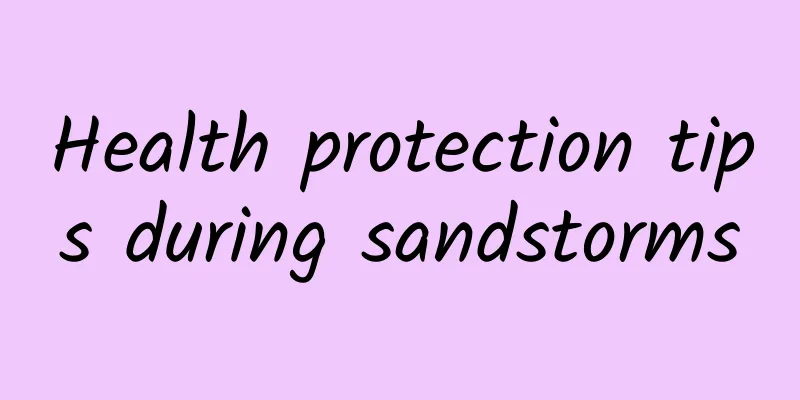Health protection tips during sandstorms

|
Health protection tips during sandstorms In dusty weather, pollutants can directly cause different degrees of irritation or allergic reactions to the human body through the mucous membranes of the eyes, nose, throat and skin. Dust particles can also enter the human body through the respiratory tract, causing a variety of respiratory diseases. The elderly, children, pregnant women, and people with respiratory and cardiovascular diseases are sensitive groups. During dusty weather, sensitive groups should avoid going out as much as possible. If they have chronic cough with sputum or shortness of breath, paroxysmal wheezing and chest pain, they should seek medical attention as soon as possible. People who must be outdoors due to their jobs, such as traffic police, sanitation workers, construction workers, etc., should take personal protective measures. When sandstorms occur, residents should stay indoors as much as possible and take appropriate measures: ①Close doors and windows in time. If necessary, seal them with rubber strips to prevent sand and dust from entering the room; ② Use wet dust removal methods such as mopping with a wet mop and wiping with a wet rag to keep the room clean and avoid re-suspension of indoor dust; ③You can use humidifiers, sprinklers and other methods to keep the air humidity appropriate; ④If conditions permit, turn on the air purifier indoors. If you need to go out, you should pay attention to personal protection: ① Wear a mask to reduce the damage of wind and sand to the respiratory tract. In sandstorm weather, there will be floating dust, inhalable particles and fine particles at the same time, so it is advisable to wear N95 or above protective masks. ② Wear windproof glasses to prevent wind and sand from damaging your eyes. If wind and sand enter your eyes, do not rub them with your hands. Rinse with running water or use eye drops as soon as possible. If you still feel uncomfortable, seek medical attention immediately; ③ Wear dust-proof equipment such as hats and scarves, and wrap your head with scarves to prevent wind and sand from damaging your skin, hair, ears, etc.; ④ After coming back from outside, you should wash your hands and face immediately, rinse your mouth with clean water, clean your nasal cavity, take a bath if conditions permit, and change clothes in time to keep your body clean and comfortable. In addition, during sandstorms, the air is dry, which can easily lead to chapped lips, dry and itchy nose and throat. You should drink more water and eat more fruits and vegetables rich in vitamins to keep your respiratory tract open and moistened, and relieve discomfort in the throat. Some of the above pictures are from the Internet. If there is any infringement, please contact us and we will delete them in time. |
>>: Why does eating pineapple make your mouth prick? It turns out it really has needles!
Recommend
The temperature has dropped! These infectious diseases are entering their peak period. How can we prevent them scientifically?
The weather turns from hot to cold It seems like ...
The most comprehensive guide to short video distribution on Tik Tok, Kuaishou, etc.!
In the Internet age, short videos are king. 2018 ...
Do you think the "cracking" sound in the joints comes from the bones? | Illustrated Science
What is the "cracking" sound coming fro...
Directly or indirectly, which is the better way to put a satellite into orbit?
In many people's impressions, satellite orbit...
The application of gamification thinking in community operations!
In the previous article "What is the specifi...
The little secret about "vegetable oil" that merchants won't tell you!
The production of most foods must comply with nat...
How to plan a complete and efficient event? (Four)
This article mainly discusses how to do a complet...
Mi fans spend more than 6,000 yuan a year to buy more than 1,000 mobile phone themes
Editor’s Note: Seeing such a willful Apple fan is...
Let the Crown go of sports Toyota's new flagship sedan "Avalon" will be unveiled
"Asian Dragon" is the transliteration o...
A 50-inch smartphone for just over 2,000 yuan? Coocaa K50J unboxing review
Which Internet TV is the best? There may be no co...
From a scientific point of view, how old can a person live at most?
December 16, 2021, is an unusual day because Alim...
New ways to play with WeChat Mini Programs in the wedding industry
The wedding industry is becoming more and more po...
Bringing a 100-inch giant screen cinema home has never been so easy: one person can come to your home and install it in half an hour
In the long history of the development of the tel...
Glow-in-the-dark jellyfish, glow-in-the-dark pigs, and why are there glow-
Produced by: Science Popularization China Author:...
Schools of programming
[[142408]] There are always people who like to ar...









